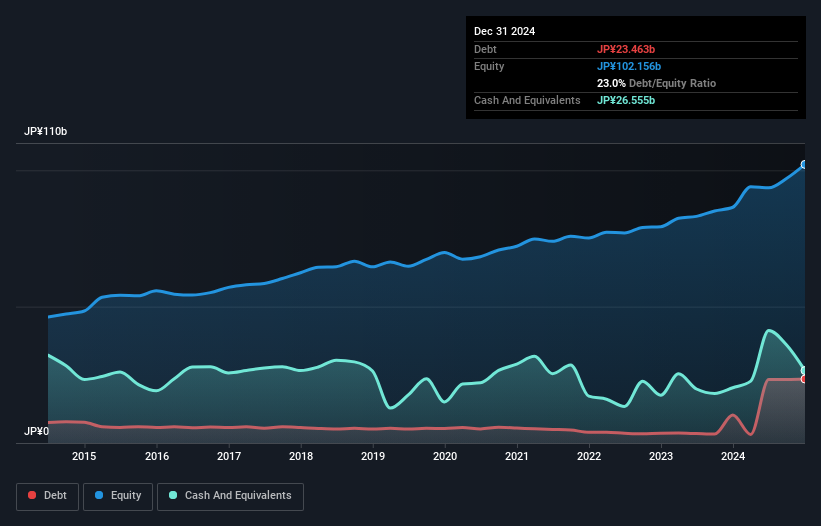
Warren Buffett famously said, 'Volatility is far from synonymous with risk.' So it seems the smart money knows that debt - which is usually involved in bankruptcies - is a very important factor, when you assess how risky a company is. As with many other companies Dai-Dan Co., Ltd. (TSE:1980) makes use of debt. But the more important question is: how much risk is that debt creating?
Why Does Debt Bring Risk?
Debt assists a business until the business has trouble paying it off, either with new capital or with free cash flow. If things get really bad, the lenders can take control of the business. However, a more usual (but still expensive) situation is where a company must dilute shareholders at a cheap share price simply to get debt under control. Having said that, the most common situation is where a company manages its debt reasonably well - and to its own advantage. The first thing to do when considering how much debt a business uses is to look at its cash and debt together.
What Is Dai-Dan's Net Debt?
As you can see below, at the end of December 2024, Dai-Dan had JP¥23.5b of debt, up from JP¥10.2b a year ago. Click the image for more detail. However, it does have JP¥26.6b in cash offsetting this, leading to net cash of JP¥3.09b.

How Strong Is Dai-Dan's Balance Sheet?
According to the last reported balance sheet, Dai-Dan had liabilities of JP¥97.7b due within 12 months, and liabilities of JP¥6.43b due beyond 12 months. Offsetting this, it had JP¥26.6b in cash and JP¥120.1b in receivables that were due within 12 months. So it can boast JP¥42.6b more liquid assets than total liabilities.
It's good to see that Dai-Dan has plenty of liquidity on its balance sheet, suggesting conservative management of liabilities. Due to its strong net asset position, it is not likely to face issues with its lenders. Succinctly put, Dai-Dan boasts net cash, so it's fair to say it does not have a heavy debt load!
Check out our latest analysis for Dai-Dan
Even more impressive was the fact that Dai-Dan grew its EBIT by 118% over twelve months. If maintained that growth will make the debt even more manageable in the years ahead. The balance sheet is clearly the area to focus on when you are analysing debt. But ultimately the future profitability of the business will decide if Dai-Dan can strengthen its balance sheet over time. So if you're focused on the future you can check out this free report showing analyst profit forecasts .
Finally, a business needs free cash flow to pay off debt; accounting profits just don't cut it. While Dai-Dan has net cash on its balance sheet, it's still worth taking a look at its ability to convert earnings before interest and tax (EBIT) to free cash flow, to help us understand how quickly it is building (or eroding) that cash balance. In the last three years, Dai-Dan created free cash flow amounting to 8.7% of its EBIT, an uninspiring performance. For us, cash conversion that low sparks a little paranoia about is ability to extinguish debt.
Summing Up
While it is always sensible to investigate a company's debt, in this case Dai-Dan has JP¥3.09b in net cash and a decent-looking balance sheet. And we liked the look of last year's 118% year-on-year EBIT growth. So we don't think Dai-Dan's use of debt is risky. When analysing debt levels, the balance sheet is the obvious place to start. But ultimately, every company can contain risks that exist outside of the balance sheet. Be aware that Dai-Dan is showing 1 warning sign in our investment analysis , you should know about...
If, after all that, you're more interested in a fast growing company with a rock-solid balance sheet, then check out our list of net cash growth stocks without delay.
New: Manage All Your Stock Portfolios in One Place
We've created the ultimate portfolio companion for stock investors, and it's free.
• Connect an unlimited number of Portfolios and see your total in one currency
• Be alerted to new Warning Signs or Risks via email or mobile
• Track the Fair Value of your stocks
Have feedback on this article? Concerned about the content? Get in touch with us directly. Alternatively, email editorial-team (at) simplywallst.com.
This article by Simply Wall St is general in nature. We provide commentary based on historical data and analyst forecasts only using an unbiased methodology and our articles are not intended to be financial advice. It does not constitute a recommendation to buy or sell any stock, and does not take account of your objectives, or your financial situation. We aim to bring you long-term focused analysis driven by fundamental data. Note that our analysis may not factor in the latest price-sensitive company announcements or qualitative material. Simply Wall St has no position in any stocks mentioned.
About TSE:1980
Dai-Dan
Engages in the design, supervision, and construction of electrical, air conditioning, plumbing and sanitary, and firefighting facilities works in Japan.
Solid track record established dividend payer.
Market Insights
Community Narratives



